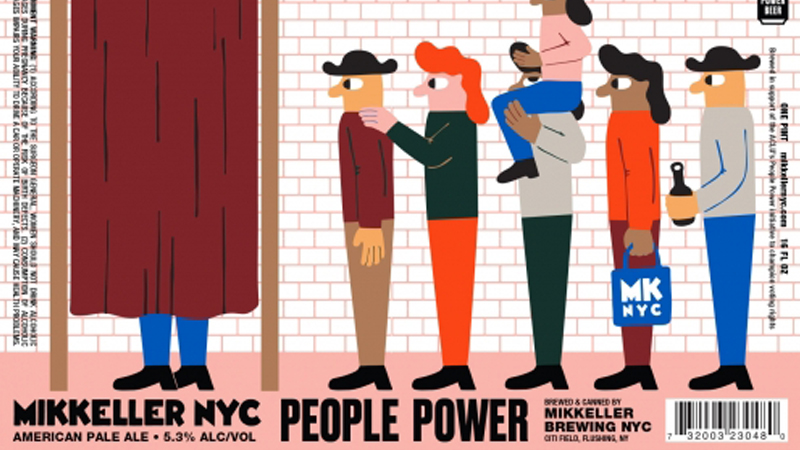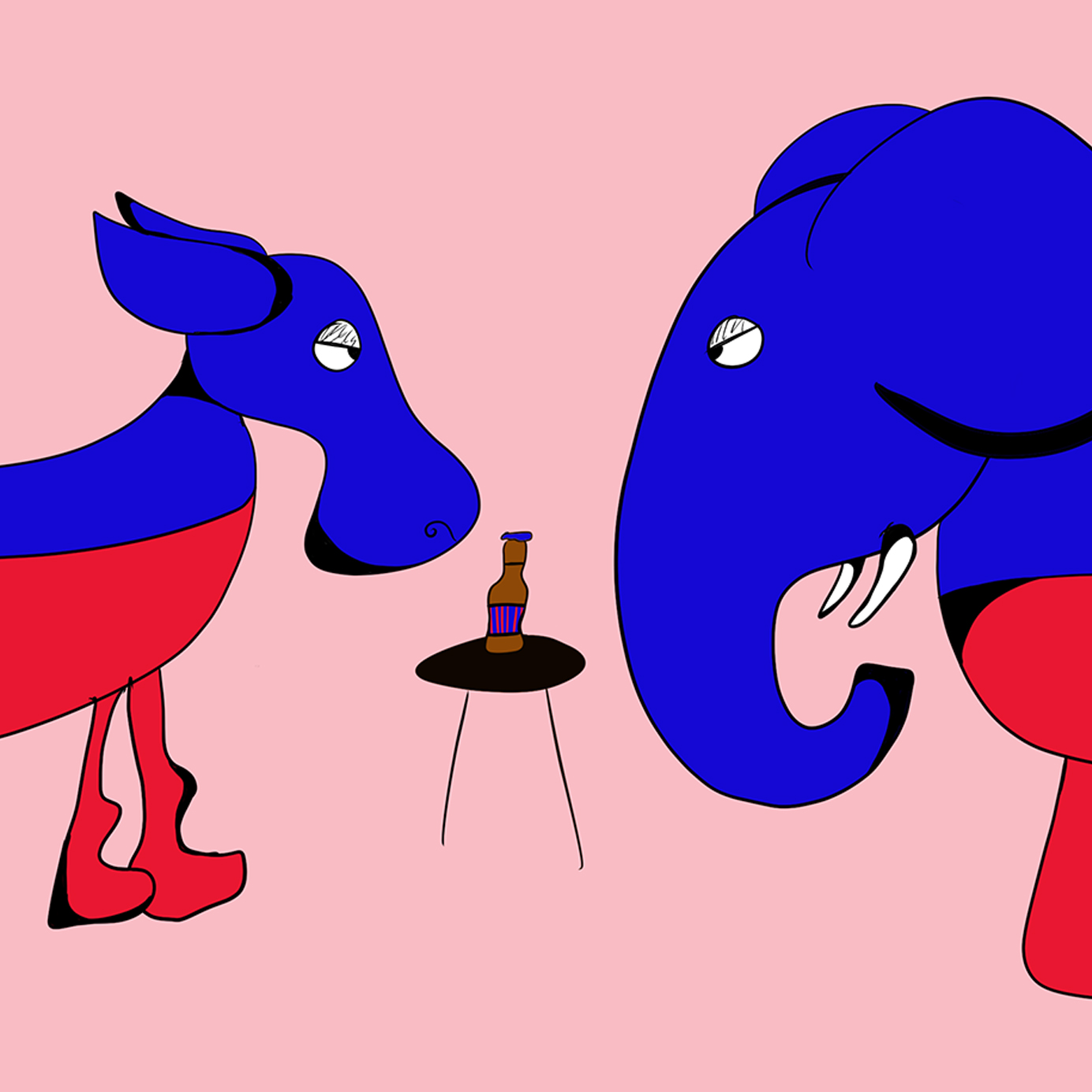You may consider it poor manners to publicly discuss politics, especially with a beer in your hand — and especially in 2018.
But beer and politics have always been intertwined. Early American public houses slung brews while patrons debated the news of the day. As legend has it, in 1775, a young apprentice was sipping a beer in a Boston pub when he overheard British soldiers discussing their next troop movement. He left the bar and relayed the message to Paul Revere, who rode through the city warning its citizens and militias of the forthcoming attack.
These days, American political fervor is difficult to ignore, at drinking establishments or elsewhere. As a result, some breweries try to avoid revealing their allegiances, for fear of alienating half their customers — or being told to stay in their lane.
“‘Stick to beer’ is extraordinary bullshit,” Barry Labendz, owner of Connecticut’s Kent Falls Brewing Co., says of the derogatory social media refrain directed at brewers who dare to take a stand. “If I only stuck to beer, it’d be the acceptance of a status quo that I refuse to stick to.”
Kent Falls Brewing is one of several craft breweries that are proudly, publicly political. Some entered the political sphere following the 2016 presidential election, offering solidarity with organizations like the American Civil Liberties Union (ACLU). Others are longtime activists that consider advocacy part of their identity. And some are dragged into political controversy unintentionally and woefully unprepared.
In a climate this heated, what happens when a brewery decides to get political? If a brewer takes a calculated risk by speaking up for their political ideals, will it help or hurt their their business? As in most political conversations, it’s contingent on who’s asking — and answering — the questions.
Brewing Up Core Beliefs
When President Trump issued a travel ban on several majority-Muslim countries in January 2018, Labendz felt he had to make his opposition known. As the son and grandson of immigrants, he couldn’t bear the thought of feeling “like I didn’t step up,” he says.
It presented a risk, though. Kent, Conn., sits in the middle of the lone Republican stronghold in the state.
Labendz chose to donate $1 of each Kent Falls bottle sales to the ACLU. After tweeting this decision, he faced some criticism on social media from those who claimed he was using his brand as a pedestal for his personal beliefs.
“We are not a brand,” he Tweeted. “We are people.”
Still, Labendz aims not to overuse his platform for practical and political reasons. “I can’t jeopardize my business because then I’d lose my voice and my job,” he says.
Chicago’s Marz Brewing is less reticent. Last month, when Supreme Court then-nominee Brett Kavanaugh repeatedly proclaimed his love for beer during his hearing, the official Marz Brewing Twitter account responded, “The worst day for beer. May he drown in it.”
A flurry of responses followed. The tweet was favorited 366 times, whereas @marzbrewing’s two prior tweets received 16 and six favorites, respectively. Other Twitter users claimed they would never buy Marz beer again, questioned the brewery’s allegiance to due process, and, of course, said Marz should stick to beer.
Marz didn’t back down. To the person threatening to eliminate Marz from their purchasing, the brewery responded, “Please do.” As for the “stick to beer” crowd? Marz had another simple reply: “Fuck off.”
Political involvement is “not necessary,” Ed Marszewski, Marz Brewing’s president and CEO, says via email. “It’s just what anyone, any company should do when confronted by bad ideas, policies, and people. We need to challenge the normalization and promotion of bad ideas, bad people, bad policies.”
(Coincidentally, Kent Falls was set to release a beer brewed with Brettanomyces on Sept. 29, 2018, the date Kavanaugh was confirmed. “It felt really uncomfortable releasing a Brett beer that weekend,” Labendz says, but it went ahead with the release. And “I’m damn glad I did it,” he says.)
On a national level, more than 70 craft breweries from 30 states are currently brewing beers called People Power in support of the ACLU initiative of the same name. A grassroots movement to expand voting rights, the People Power campaign receives 10 percent of all related beer sales through Nov. 6, 2018.
The initiative was organized by Threes Brewing, a Brooklyn, N.Y., brewery that also released a lager in support of the ACLU following the 2016 presidential election. Participating breweries include Mikkeller, Middle Brow, Cloudburst, and many others.
“Supporting organizations like the ACLU that help strengthen our democracy is in line with our values,” Evan Sallee, the CEO of Minneapolis’s member-owned Fair State Brewing Cooperative, writes in an email. “Our member-owners also vote on organizations that we will support throughout the year and they have voted in the past to support the ACLU, so initiatives like this are in many ways the result of the direct will of our member-owners.”
“Our decision [to support People Power] was a no-brainer for our brewery,” Bill Heaton of Big Elm Brewing in Sheffield, Mass., says. “Brewing a beer to help educate people on some issues and to provide a platform for voter registration is a great win-win in our eyes.”

Controversy Awaits
Some breweries in North Carolina, a historically red state, have taken to trolling the President. Gizmo Brew Works in Raleigh has a beer named Fake News, which is labeled as a New England IPA, but isn’t. (It is, however, a hop-forward beer). Asheville’s Catawba Brewing has a trademark for a beer name Covfefe.
In September, Atlanta’s Scofflaw Brewing found itself at the center of controversy when a press release claimed it would offer free beers to Trump supporters. Scofflaw has since blamed a public relations agent for the erroneous email, calling it “nonsense” and saying the brewery “could care less about … political viewpoint, only that you like our beer.”
That same month, Founders Brewing rather publicly debated pulling out of the Grand Rapids Chamber of Commerce after the group endorsed Bill Schuette, the Republican attorney general who defended Michigan’s now-overturned gay marriage ban, for governor.
A social media post — allegedly made by a rogue Founders employee — said the brewery would no longer participate in the chamber, and encouraged other Michigan businesses to do the same. Founders’ CEO later issued a statement saying the brewery was not in favor of either candidate and would remain in the organization. In the meantime, Democratic gubernatorial nominee Gretchen Whitmer posted a now-deleted Tweet of herself drinking an All Day IPA.
Meanwhile, Atlanta’s Monday Night Brewing was facing public outcry for its perceived political endorsements. On Sept. 5, 2018, Monday Night hosted a press conference with gubernatorial candidate Brian Kemp, a Trump-endorsed Republican who boasted about using his truck to “round up criminal illegals” in a campaign ad.
Many locals were outraged. “Terribly disappointed in @MondayNight,” wrote one Twitter user. “F*ck Monday Night,” tweeted another.
“We did not fully anticipate how much it would blow back,” Monday Night Brewing co-owner Joel Iverson told Atlanta Magazine. The brewery has since issued a public statement that says it does not endorse Brian Kemp nor Stacey Abrams, the Democratic candidate, for Georgia’s governor.
“To put a finer point on it,” the statement reads, “We have not contributed to Kemp’s campaign as a company or as owners.”
Bottom Line
But how does all of this — the tweets, the charitable donations, the appearances of public officials with differing views from 50 percent of consumers — affect a brewery’s bottom line?
“We are a very small brewery that puts out very small amounts of beer,” Marszewski says. “If people don’t want to buy our beer because we think Kavanaugh is a fascist scum, then someone else will probably want to buy it and drink it.”
Labendz agrees, calling fallout from Kent Falls’ politics “a small impact.” He believes that a lost customer will sometimes inspire another to buy double the allotment, and also that sometimes a stance will gain a fan in direct proportion to losing one. “More people come than get turned away,” he says.
Heaton believes Big Elm’s involvement in People Power has been good for business, but says it’s hard to quantify. People like the beer first, he says, “but also feel a sense of helping to change the current political scenario.”
Sallee isn’t too concerned about how the optics of releasing the beer — its People Power, a collaboration with Bent Paddle, is a pilsner — will affect bottom line because of the principle behind its company ethos.
“Certainly donating 10 percent of our revenues on the beer isn’t great for our bottom line, however supporting organizations like this is fundamental to who we are and what we want our business to be,” he says.
Meeting in the Middle
Michael Jordan, a famously apolitical public figure, remarked that “Republicans buy sneakers too.” The same could be said for beer. Everyone buys beer.
What we drink is not divorced from our politics, though. In 2014, The Washington Post published a chart cataloging readers’ drinking and voting habits. Those who said they preferred to drink “any microbrew,” an admittedly broad category, leaned left with a good voter turnout. Republican voters tended to favor Miller Lite, Coors Lite, and Sam Adams. (That last insight seems unsurprising, given Jim Koch’s stance on the president’s tax cuts.)
Craft brewers seeking a Michael Jordan-esque middle ground can take a cue from Maine’s Oxbow Brewing. Owner Tim Adams lives in Portland, a fiercely liberal city that houses the brewery’s blending and bottling facility. Oxbow’s beer is made in and around Newcastle, an area of Lincoln County that is less emphatically blue. (Lincoln County did vote for Clinton in 2016, but barely: Just 500 votes separated the candidates.) This can make brewery politics a delicate balancing act.
“We get a mix of people in this tasting room,” Adams says. “People can be respectful and check their beliefs at the door, but I feel like we are taking a small step to counteract the division in this country by providing this space and, no matter who the hell you voted for, this beer tastes good.”
He grows more emphatic.
“The locals know we’re a bunch of liberals out here, but we brew a beer they like to drink and they grow that food we like to eat,” Adams says. “They’re the ones that helped us with their tractors to get the tanks in here. We couldn’t exist without them … They’re an integral part of our operation. It’s definitely a community affair.”
Sprinkling in a stout or sour to political conversation could harken us back to a day when our commonalities were stronger than our divides. Whether you agree or disagree with a brewery’s political ideologies, life is much better with a beer in hand. Who knows? Maybe a nice, strong IPA could be just the thing that helps us find middle ground.
